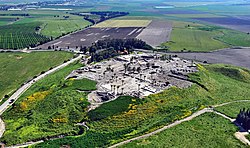Battle of Megiddo

The Battle of Megiddo, fought in the 15th century BC, saw Egyptian forces under Pharaoh Thutmose III clash with a rebellious coalition of Canaanite vassal states led by the king of Kadesh. Notable as the first battle recorded in relatively reliable detail, it featured the earliest known use of the composite bow and the first official body count. All details of the battle come from Egyptian sources, particularly the hieroglyphic writings on the Hall of Annals in the Temple of Amun-Re at Karnak, Thebes, by the military scribe Tjaneni. The battle took place on the 21st day of the first month of the third season in the 23rd year of Thutmose III's reign, which some sources date to April 16, 1457 BC.
Thutmose III’s Egyptian forces routed the Canaanite coalition, which fled to the fortified city of Megiddo, leading to a prolonged siege. The Egyptians' victory reasserted their dominance in the Levant, allowing Thutmose III to expand the Egyptian Empire to its greatest territorial extent. Thutmose's personal scribe, Tjaneni, documented the campaign in a daily journal, which was later inscribed on the walls of Amun-Re's temple. The annals detail 14 campaigns led by Thutmose III in the Levant, including the booty gained, tribute received, and offerings made to Amun-Re, highlighting the New Kingdom’s belief in the divine influence on warfare.
The campaign against the Canaanite kingdoms began after Thutmose III ended his regency under Hatshepsut and responded to a revolt led by the king of Kadesh. Gathering an army of chariots and infantry, Thutmose led his forces through a risky but unexpected route to Megiddo. The Egyptians' tactical advantage and bold maneuvers led to the Canaanites' defeat, although the rebels managed to retreat into Megiddo, prolonging the siege. After seven months, the city surrendered, and Thutmose's forces took substantial plunder while reestablishing Egyptian control. This victory marked the beginning of Egyptian dominance in the region, as defeated kings' sons were sent to Egypt for education, ensuring future rulers had Egyptian sympathies. The battle's legacy includes the origin of the word "Armageddon," derived from Megiddo's name.
Sources
[edit | edit source]- The Battle of Megiddo
- Annals of Thutmosis III
- "Thutmose III"
- The Battles of Armageddon: Megiddo and the Jezreel Valley from the Bronze Age to the Nuclear Age
- The Wars in Syria and Palestine of Thutmose III
- A modern description of the Battle of Megiddo
- Thutmosis III – The Napoleon of Ancient Egypt (in German)
